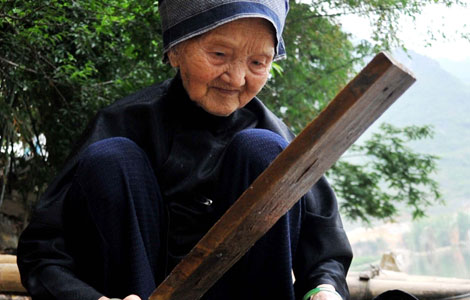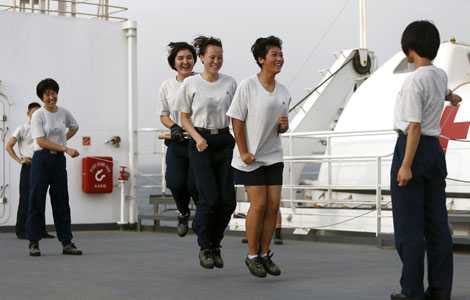Guangzhou to end controversial labor camps
Updated: 2013-09-09 00:55
By ZHENG CAIXIONG (China Daily)
|
|||||||||||
All detainees in Guangzhou labor camps will have completed their sentences and be released by the end of the year, a senior judge has said.
Authorities in the Guangdong provincial capital stopped approving applications for laojiao — a controversial system of re-education through labor — in March.
"The police and many legal experts have realized the drawbacks of laojiao and called to abolish the system, which has become outdated," Yu Mingyong, deputy president of Guangzhou Intermediate People's Court, was quoted as saying by local media.
"Many of those released from laojiao find many difficulties returning to society, families and work after ... their personal freedom has been restricted in labor camps for several years."
Guangzhou still has about 100 people in labor camps, he said.
Police with Guangzhou's public security bureau declined to comment when contacted by China Daily.
Last year, Yu's court overturned a district court's ruling that police had the right to sentence a man to laojiao for visiting a sex worker.
The man, whose identity was not released, was detained after visiting a prostitute in the city's Yuexiu district in the early hours of Dec 10, 2011. He was fined and detained in a labor camp for six months.
The 23-year-old took the police to court, arguing that the punishment was too severe. The Yuexiu district court originally ruled in favor of the police in January.
However, that verdict was later overturned on appeal by Yu's court.
The man was released and given 22,000 yuan ($3,600) compensation after serving less than six months of his sentence.
The laojiao system was established in the early 1950s and legalized in 1957 by China's top legislature. It allows authorities to detain people for minor crimes for up to four years without trial.
The system was imposed at a time when the nation was attempting to create social order after the establishment of the People's Republic of China in 1949.
Wang Da, a professor at Guangzhou University, said laojiao played an active role in ensuring social order and managing society when the country had yet to establish an advanced legal system.
"But now China has established legal procedures and facilities for prosecuting and punishing petty criminals, rendering laojiao obsolete," Wang told China Daily.
Public opposition to the practice has grown stronger in recent years, particularly among legal professionals. In response, in one of his first speeches after taking office, Premier Li Keqiang promised reforms to laojiao.
"The system should come to an end, as it runs counter to legal procedures and infringes on the rights of a citizen," Wang said, adding that it also creates opportunities for police corruption and abuse of power, as officers can put people in labor camps without any court ruling.
"Abolishing laojiao is significant in promoting the rule by law, protecting human rights and standardizing legal procedures," he added.
Peng Peng, a senior researcher from the Guangzhou Academy of Social Sciences, agreed that laojiao jeopardizes legal rights.
"Guangzhou can be a role model in gradually abolishing the decades-old system," Peng said.
Related Stories
Former official requests labor camp compensation 2013-07-26 19:42
Mother's labor camp lawsuit reaches final hearing 2013-07-03 07:58
Labor camp reform to mark progress: legislator 2013-03-09 19:34
Village official appeals after labor camp release 2012-11-29 04:55
Today's Top News
China will stay the course on sustainable growth
Syria issue should be handled within UN framework
Chinese president arrives in Uzbekistan for visit
Exports expand in August
Belgian PM 'confident' in China's economy
Network to take care of mentally ill
Trending news across China on Sept 9
Beijing set to host global tourism center
Hot Topics
Lunar probe , China growth forecasts, Emission rules get tougher, China seen through 'colored lens', International board,
Editor's Picks

|

|

|

|

|

|





